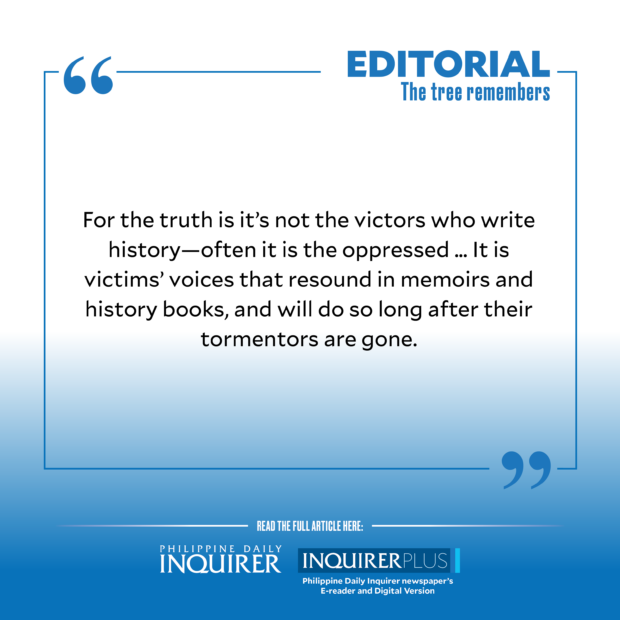The tree remembers
History is a poor teacher to a nation with a short memory.
Today, we remember when President Ferdinand Marcos Sr. proclaimed martial law 51 years ago, precipitating one of our country’s most brutal chapters. But much like his legacy, our observance of this date is a lie, because the actual event transpired two days later, Sept. 23, 1972.
A lot has happened between now and that September day. The rage and disquiet that lit the fires of the 1986 People Power Revolution have withered away, overcome by apathy. Paid social media trolls have spun a web of false narratives around martial law as a “golden age,” mocking our cries of “Never again.” The Marcoses are back in glory and power, their revival made complete by the ascent last year of Marcos’ son as our president.
Many who suffered under the 14-year regime are now the first to deny its horror, proving, as Marcel Proust wrote, that “remembrance of things past is not necessarily the remembrance of things as they were.”
It’s under this precarious light that we view the Department of Education’s (DepEd) proposal to erase the Marcos imprint from the dictatorship in the school curriculum, no doubt an attempt to revise history through official policy.
Based on a Sept. 6 memorandum from DepEd’s Bureau of Curriculum Development, the “nomenclature” for “Diktadurang Marcos” in the Grade 6 social studies program would be changed to plain “Diktadura.”
DepEd director Jocelyn Andaya explained that this was part of an “internal process” and still open to change, saying any discussion on dictatorship would involve Marcos “because no other president has implemented martial law [resulting in] loss of democratic institutions, deterioration of the economy, and ill-gotten wealth.”
But critics and teachers were not appeased, asking: Was the change meant to protect President Marcos’ image?
What’s curious is that DepEd’s actions are in conflict with statements from our leaders themselves.
In September last year, the President said “there’s no reason to revise history” for his family’s sake. “All of these are some things that are already part of history.” A month later, Vice President and Education Secretary Sara Duterte said DepEd “has no time for historical revisionism.”
Some might argue that it’s just a name, but names have power and purpose. To distance Marcos Sr. from the dictatorship is to repudiate his role in the plunder of our coffers and the torture and killing of our people.
“What kind of lesson are we going to leave to the students by removing Marcos’ name from history lessons?” asked Francis Gealogo, a history professor and lead convener of Tanggol Kasaysayan. “That it is possible to have a murder without a murderer?”
On Aug. 21, Mr. Marcos released his first message on the assassination of Sen. Benigno Aquino Jr., whose death in 1983 sparked the uprising that toppled his father’s rule three years later. “By standing for his beliefs and fighting for battles he deemed right, he became an example of being relentless and resolute for many Filipinos,” he said of Aquino.
Perhaps that was the greatest concession one could pry out of the mouth of the late dictator’s heir, and the kindest word he could say about his family’s nemesis.
Still, there are other demands we must make of the president, who is showing by his deeds and words that he’s a different man from his father.
First is accountability. The wheels of justice must turn unimpeded on ill-gotten wealth cases involving the Marcoses and their cronies, as well as the grant of reparations for survivors, without fear or pressure on the courts.
Second is education. Our public educators must drop any attempt to deodorize history and teach our youth the lessons of martial law so their generation may not repeat our mistakes. Once again, the University of the Philippines (UP) leads the way with its “We Remember” series of activities this year.
Third is the institution of memory.
The construction of the martial law museum at UP Diliman must proceed unhampered, and we hold Commission on Human Rights chair Richard Palpal-latoc to his word that the project will push through under this administration.
Once built, the “Freedom Memorial Museum” will be our monument to victims of martial law, in the same way Germany honors victims of Adolf Hitler’s Holocaust through the Memorial to the Murdered Jews of Europe, and Cambodia remembers victims of Pol Pot’s killing fields through the Tuol Sleng Genocide Museum and Choeung Ek Genocidal Center.
It will serve as a powerful reminder to our leaders and people that the Marcos family’s return to power does not mean history has been rewritten.
For the truth is it’s not the victors who write history—often it is the oppressed. As shown by those behind “Project Gunita” who work to preserve martial law records, it is victims’ voices that resound in memoirs and history books, and will do so long after their tormentors are gone.
As the old African proverb goes: “The axe forgets, but the tree remembers.”

















